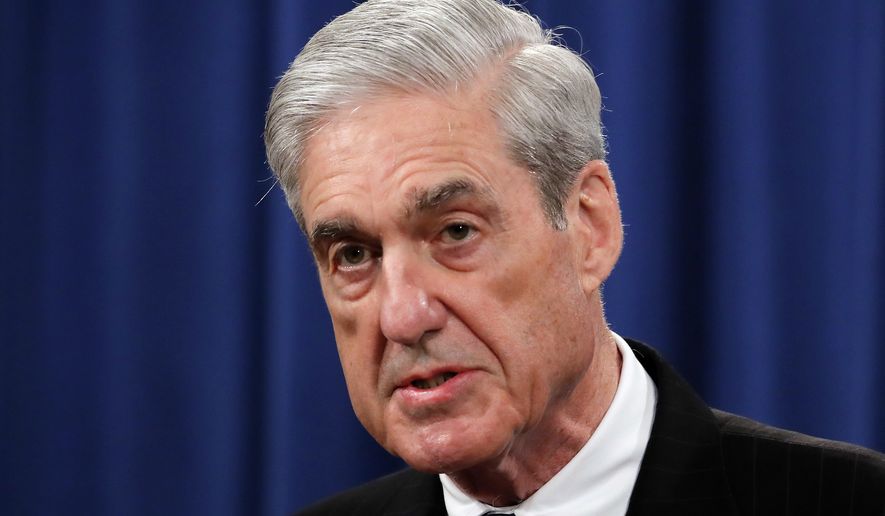A federal judge has chastised former special counsel Robert Mueller and Attorney General William P. Barr for stating that the Russian government was behind election year social media trolling when there is no evidence presented by prosecutors.
The ruling by U.S. District Judge Dabney L. Friedrich culminated a secret legal battle between the Justice Department and the Russian firm Concord Management and Consulting LLC.
The judge this month began unsealing legal briefs and transcripts, which reveal that the release of Mr. Mueller’s 448-page report and Mr. Barr’s public statements triggered Concord attorney Eric A. Dubelier to seek contempt proceedings against both.
Mr. Dubelier said Mr. Mueller prejudiced a potential jury by stating that the Kremlin ran the social media campaign, which the federal government says Concord funded. That connection isn’t contained in the special counsel’s February 2018 indictment against Concord.
“That’s not alleged in the indictment primarily because there is no evidence to support that it was. There is none,” Mr. Dubelier told the judge at a closed May 28 hearing for which a transcript was just unsealed.
The conclusion at this stage means Russian President Vladimir Putin backed one major election intervention: his military intelligence hacking of Democratic Party computers and sending stolen materials to WikiLeaks for release.
But he might not have been involved in the parallel social media trolling, though U.S. media reported that it was part of a larger Kremlin conspiracy.
Judge Friedrich concurred that there was a lack of evidence.
Court observers say Mr. Mueller might have withheld evidence from his public report and from the court case for security reasons.
His report cleared President Trump of allegations of conspiring with Moscow.
Mr. Dubelier told the judge that Mr. Mueller and Mr. Barr violated a Justice Department criminal rule by stating before trial that Concord committed an offense.
“The court has discretion to impose sanctions on AG Barr and SC Mueller,” he said. “Specifically, sanctioning the government’s conduct now will highlight the impropriety of the government’s statements and potentially remove any taint that may have infected the jury pool as a result of those statements.”
Federal prosecutors are allowed to publicly set out what they see as facts in an indictment. But to avoid prejudicing a jury, they may not declare the target as guilty and must state that all defendants are considered innocent pending trial.
Mr. Dubelier said Mr. Barr has acknowledged that he released the Mueller report by overriding Justice guidelines that say special counsel reports should stay confidential.
“It was political interest,” he told the judge. “It has nothing to do with law enforcement.”
In a rare rebuke of Mr. Mueller from a judge in U.S. District Court for the District of Columbia, Judge Friedrich agreed that both the special counsel and attorney general violated the rule.
“In short, the Court concludes that the government violated [the rule known as] 57.7 by making or authorizing the release of public statements that linked the defendants’ alleged activities to the Russian government and provided an opinion about the defendants’ guilt and the evidence against them,” Judge Friedrich said.
She declined, however, to punish either person. Instead, she admonished the prosecutor not to speak publicly about Concord.
According to a January 2017 intelligence community assessment, Russian election interference hurt Hillary Clinton and helped Mr. Trump in two main ways: through social media trolling and fake online advertisements. The indictment says these actions were undertaken by the Internet Research Agency and funded by Concord.
The Russian government simultaneously conducted a second direct intervention by hacking computers.
Judge Friedrich said the Mueller report erred by attributing the Internet Research Agency to Russia instead of Russian individuals.
She said Mr. Barr went further by saying the Kremlin “sponsored” Concord.
“It is significant and prejudicial that the government itself drew a link between these defendants and the Russian government,” the judge said.
Mr. Mueller, who is to testify Wednesday before two House committees, resigned in May and turned over Concord’s prosecution to the U.S. attorney for the District of Columbia.
Assistant U.S. Attorney Jonathan I. Kravis disagreed with Judge Friedrich.
“The report does not say that the Russian government participated in the activity that is charged in United States v. Internet Research Agency,” Mr. Kravis said.
Mr. Dubelier said the report clearly states on Page 35 that the Kremlin was involved.
“The investigation established that Russia interfered in the 2016 presidential election through the ’active measures’ social media campaign carried out by the IRA,” the report said.
The damage, he said, has been done to finding unbiased jurors.
“That’s what the headline was in every single major news organization that reported this,” he said. “This was a Russian government-run operation.”
Mr. Dubelier previously has argued that taking on false identities on social media is not a crime. If it were, lots of people would face criminal charges, he said.
Mr. Kravis attributed Mr. Barr’s congressional testimony to “loose language.”
“I think, at best, these are cherry-picked statements from what is at this point a large public record of statements about this activity,” he said.
The Obama administration’s official intelligence community assessment said the Kremlin engineered the hacking and the social media campaign, as carried out by the Internet Research Agency.
The Concord court record cast doubt on that conclusion.
• Rowan Scarborough can be reached at rscarborough@washingtontimes.com.




Please read our comment policy before commenting.